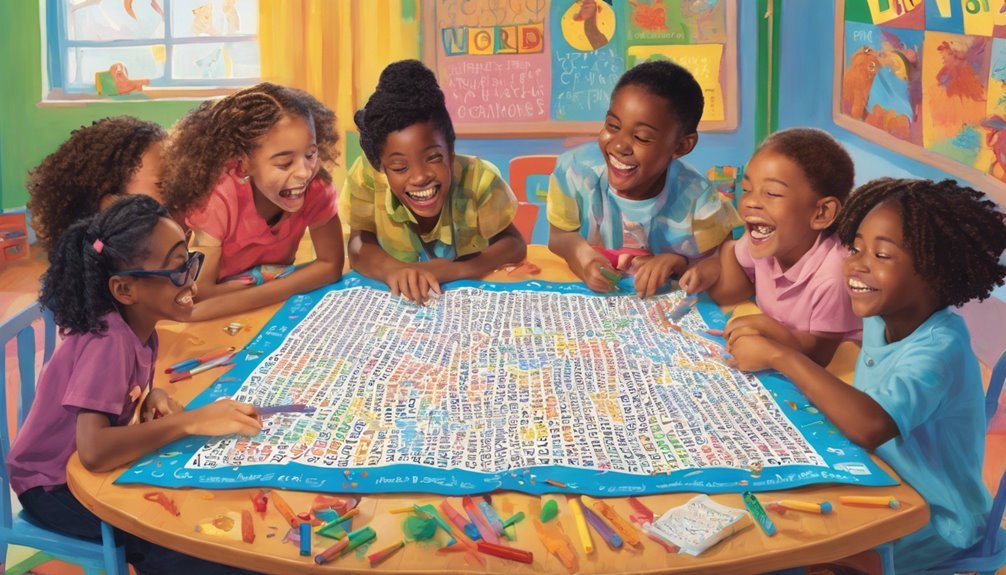Word search puzzles can be a great way to reinforce learning, but they can also feel a bit stale. To make them more engaging for kids, think about incorporating themes that spark their interest, like animals or favorite characters. You can also add interactive elements to create a challenge. Curious about how to blend fun with education effectively? Let's explore some creative strategies that will keep kids excited and eager to participate.
Key Takeaways
- Incorporate themes that resonate with kids' interests, such as animals or holidays, to enhance engagement and enjoyment.
- Add clues or definitions related to the words to reinforce vocabulary and comprehension.
- Implement timed challenges or competitions to create excitement and encourage friendly rivalry among kids.
- Utilize digital tools or apps for interactive puzzles that provide immediate feedback and gamified learning experiences.
- Organize collaborative activities, like team races or tournaments, to promote teamwork and collective problem-solving.
Themed Word Searches: Making Learning Fun
When you introduce themed word searches to your kids, you're not just giving them a fun activity; you're also sparking their curiosity and enhancing their learning experience.
By incorporating themes like holidays or animals, you create a connection between the puzzle and their interests, making it more engaging. For instance, during themed holidays, you can use words related to Christmas, Halloween, or Thanksgiving, helping your kids learn while they search.
Animal themes can also ignite their fascination with wildlife, encouraging them to explore further. As they hunt for words, they'll improve vocabulary, spelling, and pattern recognition.
Themed word searches blend education with enjoyment, ensuring your kids have a well-rounded, enriching experience that keeps them coming back for more.
Incorporating Educational Elements
Themed word searches not only entertain kids but also offer a fantastic opportunity to incorporate educational elements into the activity. By selecting themes relevant to their studies—like science, geography, or history—you can enhance vocabulary building. Each word they uncover reinforces their understanding of key terms and concepts.
Additionally, you can challenge kids by including words with varying difficulty levels, encouraging critical thinking as they strategize how to locate each word. Incorporating clues or definitions next to the word list can heighten engagement, prompting kids to think critically about the meanings behind the words.
Ultimately, these educational elements make word searches not just a fun pastime but a valuable learning tool that supports cognitive development.
Interactive Word Search Challenges

While traditional word searches are fun, interactive word search challenges take the excitement to a whole new level.
These challenges not only keep kids engaged but also foster friendly competition. You can organize online competitions or create puzzle scavenger hunts that encourage teamwork and strategy.
Here are some ideas to enhance the experience:
- Set a time limit for completing the puzzle.
- Incorporate hints or clues related to the words.
- Use themes that resonate with kids' interests.
- Offer small rewards for the fastest completion.
- Create a leaderboard to track progress.
Using Technology to Enhance Engagement
As kids explore word search puzzles, technology can significantly enhance their engagement and learning experience.
Leveraging digital tools like puzzle apps makes it easier for them to create and solve personalized word searches. Online resources offer a variety of themes, ensuring the puzzles align with their interests.
By incorporating gamified learning elements, you can turn these activities into educational games that motivate kids to participate actively. Interactive platforms allow for immediate feedback, keeping them invested in their progress.
Encourage kids to compete or collaborate with friends through these apps, making the experience even more enjoyable.
Collaborative Word Search Activities

Engaging in collaborative word search activities can transform a simple puzzle into a fun group experience. By incorporating team-based challenges, you encourage kids to bond and strategize together.
Here are some ideas to enhance engagement:
- Pair Up: Have kids work in pairs to find words faster.
- Timed Races: Create a sense of urgency with a time limit for extra excitement.
- Peer Competition: Organize a tournament where teams compete against each other.
- Themed Puzzles: Use specific themes to spark interest and discussions.
- Group Reflection: After the activity, let teams share their strategies and favorite moments.
These collaborative approaches not only make word searches more enjoyable but also foster teamwork and critical thinking skills.
Customizing Puzzles for Different Age Groups
Customizing word search puzzles for different age groups ensures that every child finds the activity both challenging and enjoyable. Start by selecting age appropriate vocabulary that aligns with their learning level. For younger kids, use simple words related to familiar themes like animals or colors.
As children grow, introduce more complex terms and themes that require deeper thinking. Make difficulty adjustments based on their skills. For younger children, keep grids smaller with fewer words, ensuring they can complete the puzzles without frustration.
For older kids, increase the grid size and the number of words, adding diagonal and backwards placements to enhance the challenge. This tailored approach helps maintain interest and fosters a love for learning through engaging activities.
Frequently Asked Questions
How Can I Create My Own Word Search Puzzles?
Creating your own word search puzzles is a fun project! Start by selecting custom themes that interest you, like animals or sports.
Decide on the puzzle difficulty by adjusting the word length and placement. Use graph paper or an online generator to layout your words, hiding them in various directions.
Once you've filled the grid, print or share it digitally. You'll enjoy seeing others tackle your unique creations!
What Age Group Enjoys Word Searches the Most?
Kids aged 6 to 12 tend to show the highest word search preferences, engaging eagerly with puzzles that match their reading skills.
At this age, they're developing critical thinking while enjoying the challenge of finding words.
Younger children might get frustrated, while teens may see them as too simplistic.
Tailoring puzzles to specific age engagement levels helps maintain interest, ensuring they're both fun and educational for your audience.
Are There Benefits to Solving Word Search Puzzles?
Yes, there are several benefits to solving word search puzzles. They enhance your cognitive development by improving problem-solving skills and boosting memory retention.
As you search for words, you actively engage your brain, which can sharpen focus and concentration. Additionally, these puzzles help improve language skills by expanding your vocabulary and reinforcing spelling.
How Long Should a Word Search Puzzle Be?
Imagine diving into a sea of letters, where the right puzzle length makes all the difference!
For a typical word search, a grid size of 10×10 to 15×15 is ideal, providing enough challenge without overwhelming you.
If you're crafting for kids, keep it shorter—around 8×8 to 10×10—to maintain their interest.
Ultimately, the perfect puzzle length balances difficulty and enjoyment, ensuring a satisfying experience as you hunt for hidden words.
Can Word Searches Help With Spelling Skills?
Absolutely, word searches can significantly aid in spelling practice. As you search for words, you're actively engaging with the letters and their arrangements, which reinforces your understanding of spelling patterns.
This activity also promotes vocabulary enhancement, as you encounter new words and contexts. By frequently solving word searches, you develop a stronger grasp of spelling and improve your ability to recognize and recall words, making it a fun yet educational exercise.
Conclusion
By incorporating themes and interactive elements, you can transform word search puzzles into exciting learning experiences for kids. Did you know that children who engage in puzzle-solving can boost their vocabulary by up to 20%? By using technology and fostering collaboration, you not only enhance their enjoyment but also reinforce essential skills. So, get creative with your puzzles and watch the kids dive into a world of learning and fun!




